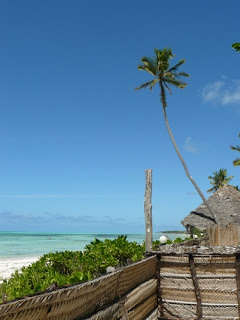I’m staying in Jambiani- a small beach side town on Zanzibar. I am here for a week getting a taste of life as a volunteer with African Impact- and also glimpsing life in an African town.
The rambling township is mostly built from coral, which the locals are careful to point out is cut not from the reefs but inland. People mostly get about on bicycles or on foot, and there are children everywhere you look shouting “Jumbo” at the muzungos. The houses are coral, the roads are coral and the gardens are grown in coral. The dusty grey of the town is contrasted with the most spectacular white sand and blue green water.
My days volunteering in Jambiani equal dealing with so much that is new, rushing to catch up and figure things out so that I can contribute something, make friends, keep up online stuff, have a swim, ride a bike on a road made of coral, getting my skirt stuck in the wheel of my bike on a road made of coral, going for a run on the beach before sunrise, not speaking the language, learning a new language, teaching adults, teaching kids, playing with kids, dealing with heat, power outs, planting trees, watering trees, young men who are too interested, crying thirsty children, lots of hyper girls, having my period and struggling to relax while I wait around for whatever is next on the list of things to do.
Swahili is spoken in Zanzibar, but English is the language in which high school exams are set. The better your grounding in English the better your chances are of going to University or getting a decently paying job. In Jambiani most families rely on income from is seaweed collection. While I am told the wage is going up because of increased competitiveness in the market, the wage is between $12 and $60 USD a year. The key to a future of prosperity in Zanzibar is seen as tourism and if locals want to move beyond in menial jobs education is essential.
At first it is all on overload and I wonder if there is anything useful that can come out of the chaos. It is immediately clear that everyone is putting in loads of positive energy, but at times it seems a bit like the push-me-pull-you- a multi headed animal that cannot quite agree on where it is headed. My desire to get things done in an efficient way, to be on time and most of all not to waste time conflicts strongly with life in Africa.
Being an early person in a place where everything runs at its own pace can raise your blood pressure.
But then as my days rush past the question shifts: from what can I do to help? -to - can I shift my headspace to help me fit with this place?
From- how can I make every second of this day as efficient as possible?- to - can I spend this hour right now reading with this young man, and give him all my attention so that at the end of our time together he comes away having learnt something?
The question- can I help a class of five year old children learn the English words for “mother” “father” “son” “daughter” without worrying about fifty other things at the same time is answered quickly- and in the affirmative.
In a class of 36 five year olds who all speak another language, you do not have time to think about yourself. There is no quiet. Everything is at full volume and moments of concentration quickly dissolve into a mess of crying children, hitting each other, eating blu tack, demanding a sharper pencil, children falling asleep because they have had no food today, climbing on desks and running in circles, calling “teacher, teacher” and grabbing at any passing body.
And yet amidst the chaos there will still be two or three children sitting quietly doing their work. Scribbling out words in a foreign language as best as five year olds can.
And seeing them hard at it makes you feel like there is some point to your being there.
I know that I am not here for long enough to have a big impact – on my students or my own brain- but occasionally there are moments that seem to slow down and connect.






No comments:
Post a Comment